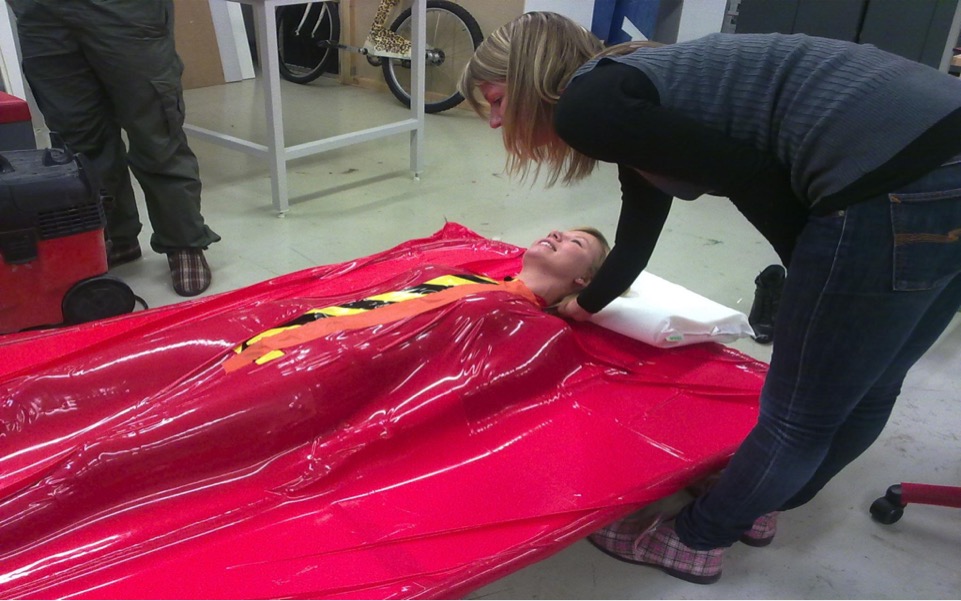I recently defended my PhD thesis looking into how practitoners with little or no experience on creative problem-solving practices approach ambigious problems and, on the other hand, how this type of work should be supported. My research got started at the Design Factory and the data was gathered from Design Factory-based industry project courses and from companies involved in research projects based at DF. Below is the transcript of the introductory lecture I gave at my defence.
Lectio praecursoria 30.08.2019
We are standing on the brink of the fourth industrial revolution. The gap between the digital, physical, and biological worlds is shrinking. Innovations will be increasingly based on novel combinations of diverse technologies and bodies of knowledge. This requires efficiently incorporating the expertise of distinctly different fields, along with not only utilizing but also integrating the practices and approaches of different disciplines. At the same time, we are facing severe global challenges and changes in working life, from automation to sustainability to climate change to disruptive technologies. All these factors force organizations to rethink the way they operate and push them to innovate relentlessly and continuously.
In my dissertation, “Managing for knowledge creation in exploratory projects”, I explore how practitioners with little to no experience in creative problem-solving practices approach ambiguous problems and, on the other hand, how this type of work should be supported. Exploratory projects are the kinds of projects for which we cannot define the end result in advance, as not all of the relevant knowledge is available, or even existent. My insights draw from a total of 81 interviews and 7.5 hours of video data. The data was gathered from both established organizations and master-level university courses in which students tackled real-life challenges introduced by industry sponsors. The data covers both project managers and project team members.
Next, I am going to describe the setting of my dissertation on changes in work life and the rise of artificial intelligence.
The ability to solve ill-defined problems becomes increasingly important
We all know that routine work will be largely taken over by machines over time. We know that the changing nature of work places increasing importance on those activities that are the most distinctive to humans and the most difficult to automate: activities such as creative problem-solving, critical thinking, and collaboration. The World Economic Forum has recently deemed these skills to be central future skills and abilities that will remain overwhelmingly human; they are hence unlikely to be replaced, but will merely be complemented by machines and algorithms. With more routine work taken over by automation and with the problems we face growing increasingly complex, human resources are increasingly needed in solving so called ill-defined problems – problems that have no clear goals, evident solution paths, or expected outcomes. The ability to solve these ill-defined problems will become even more indispensable not only for those already immersed in working life but also for those just about to enter it. The increased need to solve ill-defined problems requires moving from the more linear problem-solving approaches dominant in many organizations toward non-linear, diverging, and generative approaches. This means that professionals who have decades of experience with conventional problem-solving approaches or managing these endeavours may well be regarded as novices when it comes to approaching ambiguous, ill-defined problems. Likewise, the young generation entering the workforce is expected to maneuver with tasks that require creative problem-solving approaches from day one, as the routine type of work that previously functioned to familiarize people with work life will disappear. All of this increases the need to understand how to best support this type of work.
In exploratory projects, project management becomes process management
Innovation activities in organizations are typically organized as projects. Projects are used to develop novel products, services, or processes; to develop new technologies; and to organize the uncertain and ambiguous process of exploring new innovation fields. The project management discipline traditionally values such things as planning, meeting deadlines, monitoring, and coordinating. Traditionally, the duty of the project manager is to isolate from all anticipated goal changes only those that are truly necessary to the successful implementation of the project. These approaches have been, and still are, highly relevant when the goal is clear and unlikely to change and when the information is unambiguous. However, in situations where neither the goal nor the means to reach the goal are known at the outset – in other words, in exploratory projects – different kinds of approaches are required.
My main claim is that in the context of exploratory projects, the role of the project manager shifts from managing the efficient execution of the project toward facilitating an iterative development process.
The need for change in project management runs parallel to the significant changes in work. Efficiency is still necessary but no longer sufficient to triumph in this new environment. The immediate managers, often with titles such as “project managers,” “product owners,” or “business managers,” are the ones responsible for guiding the project team through the development process. Where more traditional development projects start by narrowing the field toward a predefined goal driven by milestones and deliverables, exploratory projects start by expanding and exploring a variety of ideas to approach the challenge at hand. In exploratory projects, knowledge created during the project defines the next steps to be taken, which makes proceeding according to a predefined plan impossible. Rather than solving a predefined problem, they start by defining the right problem to be solved. Rather than delivering a given target, they propose possible solutions to open problems. In other words, exploratory projects organize the process of solving ill-defined problems in organizations. There is no doubt that managing exploratory projects entails a fundamental shift in project management. This shift implies that, in many cases, the project managers – the experts on delivering expected results on time and on budget – will be novices regarding the processes and methods needed in exploratory projects.
Ambigious problems tempt to jumping into premature conclusion
I will now explicate my main claim on the role of the project manager shifting toward facilitating the iterative development process in three ways.
First, a key component in approaching ill-defined problems is the gradual development of the problem framing and, through this, the development of the solution. This requires maintaining an open mind toward alternative development opportunities and avoiding premature decisions on solutions. My study shows that the practitioners with little to no experience with these approaches have a tendency to jump to conclusions instead of sufficiently exploring different development opportunities. Locking in on a direction to pursue provides them with significant relief and satisfaction. This approach leaves only little, if any, room for innovation and is an issue that requires special attention from the project manager.
Second, central to solving ill-defined problems is the team’s ability to generate alternative solutions and narrow these down to choose the solutions to continue working with. In other words, the team must apply divergent and convergent thinking. In divergent thinking, team members need to take different perspectives, openly communicate their ideas, and utilize their varied knowledge and capabilities. On the other hand, when moving toward convergence and narrowing down the solutions, the team members need to evaluate and select from among possible alternatives. Here, it is important that different perspectives from different disciplines are considered and that team members can explain and rationalize their point of view. The more information the team has available to build on, the more likely it is to develop a novel and valuable solution. My study shows that neither working in these different modes and moving between them nor getting all team members to voice their perspectives is easy. In fact, this was one of the main challenges faced by the practitioners in my study.
Third, the team’s ability to learn and create knowledge from the iterative testing of ideas– that is, experiments – is necessary. Experiments are conducted to learn about the challenge at hand, which requires careful interpretation of the feedback received from them. My study shows that practitioners new to experimentation often overlook unexpected information, bypass meaningful comments, and fail to see how the attained feedback could be used to improve the original idea. In my study, the prevailing attitude appeared to be that an idea was considered ready to be implemented if the first experiment provided positive feedback. Experimentation was considered as piloting and validating, rather than as exploring. The study leaves no question regarding whether mangers should pay explicit attention to supporting learning from experimentation.
Team communication is essential to effective development teams
To summarize the contributions of my dissertation, the main managerial implications are the following:
- First, project managers should pay explicit attention to creating circumstances under which frequent communication, respectful interaction, and thus the integration of diverse types of knowledge can take place. Practices supporting an open and trusting atmosphere must be purposefully established early in the project.
- Second, project managers should insist on the development team going deeper in its experiments and being prepared to not only repeat design activities but also engage in the thinking needed to continue with experimenting.
- Third, project managers should offer a supporting structure – that is, the time, place, and needed guidance for systematic reflection – to ensure the project team takes the time to build on accumulated learning throughout the project. The key is supporting the project team to go beyond just collecting information toward refining this information into insights and new knowledge.
A theoretical contribution of my dissertation is insight into the dynamic nature of exploratory projects. In particular, the divergent and convergent phases call for different kinds of approaches and mindsets, not only from the project manager but also from the project team. Another theoretical contribution is the perspective on the experiences and needs of the project team members, that is, the followers of the project manager. While the management discussion is often based on thinking about “what should be” instead of “what actually is,” my dissertation creates understanding on the lived experiences of practitioners. This leads us to the third theoretical contribution: the adoption of a micro-level view in investigating how practitioners new to the approach undertake experimentation, a key element of exploratory projects. This approach revealed that reflecting on feedback from experiments and interpreting their influence on future steps represent one of the most demanding features, yet differentiate experimenting from piloting ideas.
My dissertation shows that there are distinctive key challenges related to managing exploratory projects that we need to acknowledge and counter. Based on the findings of the five articles, project teams will most likely encounter the following challenges in the context of exploratory projects:
- ambiguities related to one’s role in and contribution to the project
- integrating the knowledge of the diverse team
- moving from generating solutions to selecting those to continue working with, and
- going deeper in experimenting with ideas to move beyond information to create knowledge.
My firm belief is that supporting these endeavors are skills that will prove necessary for project managers to master. The articles in my dissertation seek to contribute to the ongoing discussion on managing exploratory projects. My research continues to bridge the discussions of neighboring disciplines – project management, innovation management, and design research – and to thereby create a more holistic understanding of supporting solving ill-defined problems in exploratory projects.
Electronic dissertation: https://aaltodoc.aalto.fi/handle/123456789/39371
 Aalto DF
Aalto DF